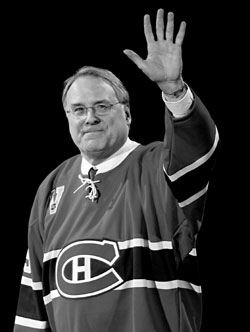Canadiens honor Ken Dryden
MONTREAL, Canada: In the 1970s, Canadian children netminding in hockey games at rinks, on frozen ponds or even on the street, took to standing upright and leaning casually on the butt end of their sticks during lulls in the action.
On Monday night, the NHL's Montreal Canadiens retired jersey number 29, raising it to the rafters in homage to its former wearer, Ken Dryden, the lanky goalie whose iconic on-ice pose was copied by those youngsters decades earlier.
Former Montreal Canadiens goaltender Ken Dryden waves to the crowd during a ceremony to retire his number “29” in Montreal on Monday. AP |
Dryden, now a 59-year-old lawyer, author and politician, thanked the fans for their support all those years ago and in helping him and his wife Lynda make Montreal their home during his NHL years.
"You have given us a gift, a gift that has lasted 35 years, a gift that will last a lifetime," Dryden said.
Surrounded by family and friends, Dryden stood on a red carpet before the goal he used to defend as his jersey number was hoisted high to deafening cheers of "Dryden, Dryden!"
Dryden played in an era when the Canadiens dominated hockey to such an extent that local fans could count on a Stanley Cup victory parade in downtown Montreal most summers.
For Dryden, now part of the shadow cabinet of Canada's opposition Liberal Party, one of his most cherished memories from his hockey days was the 1976 Stanley Cup victory, the first of four in a row.
That year, the Canadiens swept through the regular season and playoffs, beating the Philadelphia Flyers in four straight games to reach hockey's pinnacle.
Dryden, who at 6ft-4ins towered over his goalposts, despised the rough play of Philly's "Broad Street Bullies".
"I hated the Flyers. Of all the teams, that was the one I had that feeling about," he said.
School first
Hamilton, Ontario-born Dryden's path to hockey stardom was an unusual one, dominated by self-doubt about his goaltending abilities and determination to get a higher education.
Drafted in 1964 by the Boston Bruins, Dryden opted instead to pursue a Bachelor of Arts degree at Cornell University, where he also played hockey and was named an all-American for three straight years.
"It was an easy choice, because I knew I was never going to be good enough for the NHL anyway," Dryden said.
He joined the Canadiens' farm team, the Montreal Voyageurs, in 1970, all the while studying law at McGill University. Dryden made his first start with the Canadiens late in the 1970-71 season, and went on to win all six games he played.
In a display of sprawling prowess between the posts, Dryden led the team to a Stanley Cup that season and won the Conn Smythe Trophy as the most valuable player in the post-season.
After a summer job working for consumer activist Ralph Nader on a water pollution project in Washington, D.C., Dryden won the Calder Trophy in 1971-72, his first full season, as the NHL's top rookie.
Along with Tony Esposito, Dryden backstopped Team Canada to victory in the legendary 1972 Summit Series against the Soviet Union's hockey team.
As the Canadiens won the Stanley Cup again in 1973, Dryden took home the Vezina Trophy for being the NHL's top goalie. More awards followed as the Canadiens claimed four straight Stanley Cups from 1976 to 1979.
Dryden retired from hockey at age 31 with the best winning percentage in NHL goaltending history. He notched 46 shutouts and lost only 57 games, just two of the stunning statistics that got him inducted into the Canadian Hockey Hall of Fame in 1983.
Agencies
(China Daily 01/31/2007 page23)















